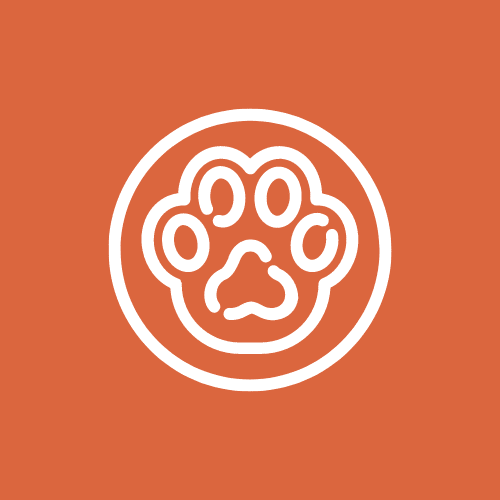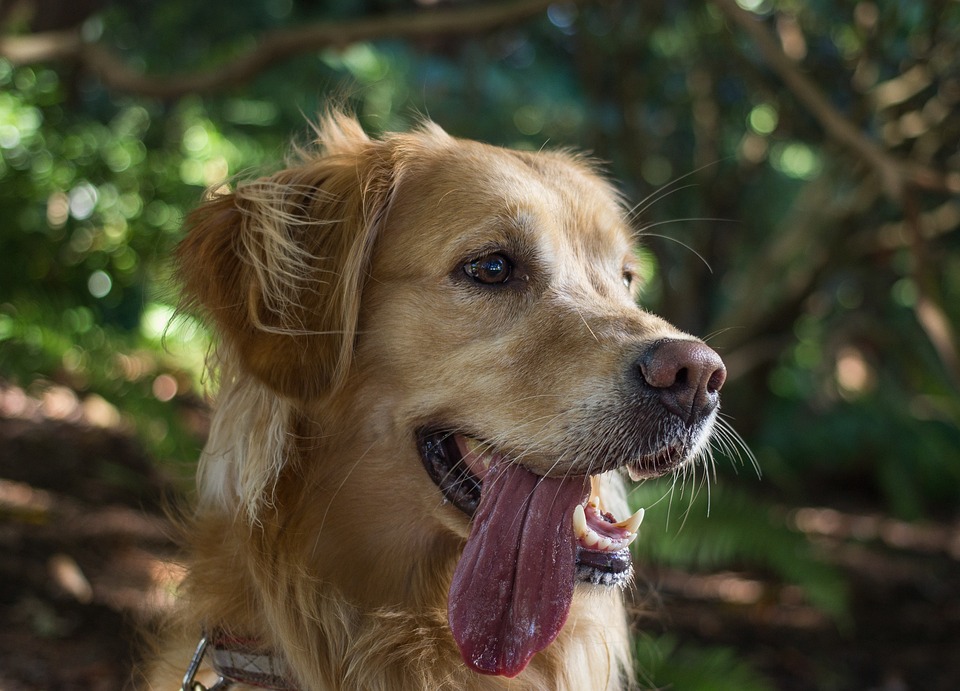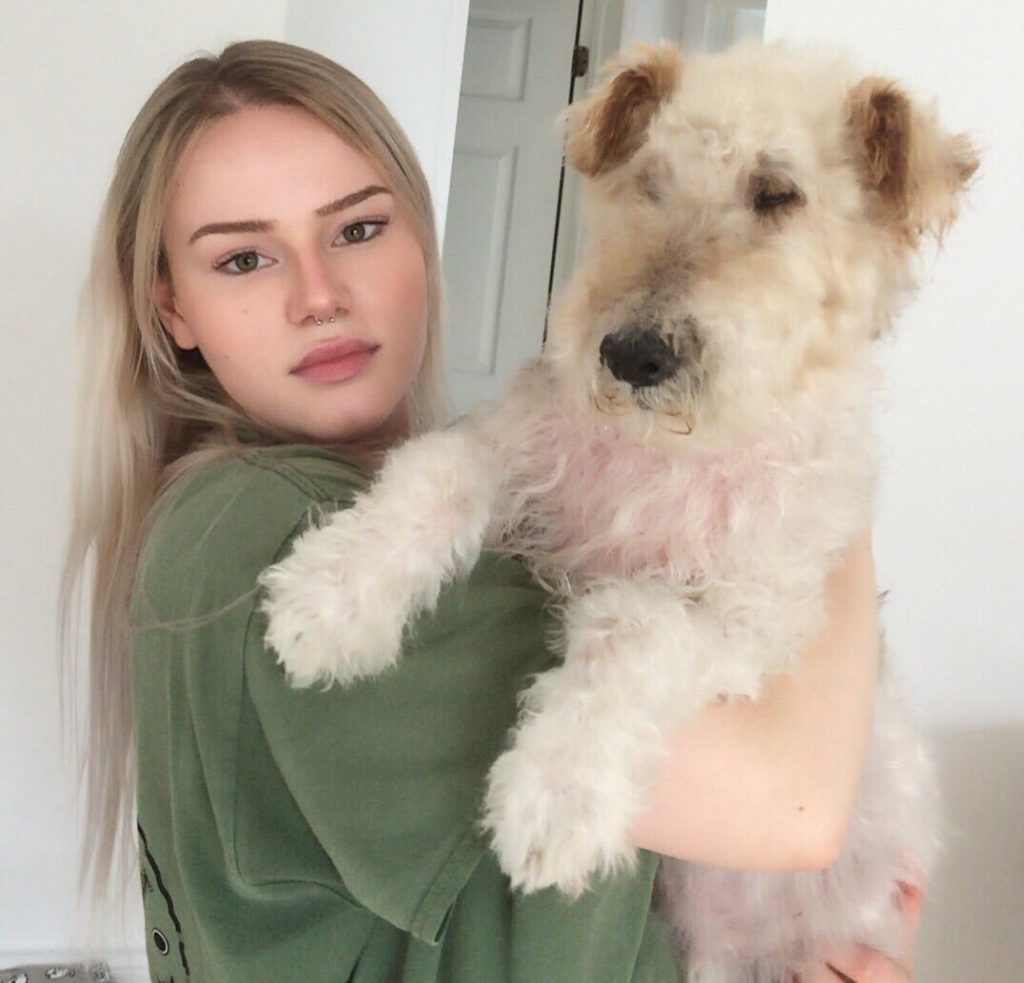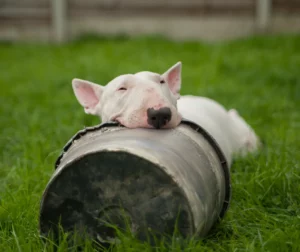It can be difficult to know exactly what is wrong when your dog shows symptoms of diarrhea and excessive panting. These signs can be linked to various causes, ranging from stress and anxiety to more serious health problems such as pancreatitis or gastrointestinal obstruction.
Abdominal pain
When a dog feels pain or discomfort in their stomach, they may react by panting frequently to show that they are feeling unwell. In addition, these stomach aches can cause digestion changes, leading to diarrhea episodes.
Several causes can be at the origin of stomach aches in dogs, here are some examples:
– Improper diet: Eating too much, sudden changes in diet, or eating spoiled food can cause stomach aches in dogs.
– Food intolerances: The development of intolerances to certain food ingredients can cause irritation in the digestive system.
– Gut Infections: Bacterial, viral, or parasitic infections in the gut can lead to stomach upsets and diarrhea in dogs.
– Irritable Bowel Syndrome: Irritable bowel syndrome is a common condition in dogs, causing abdominal pain and bouts of diarrhea.
– Poor Digestion: Poor digestion of food can cause gas and bloating, leading to abdominal pain in dogs.
When dogs have abdominal pain, they may also show symptoms of diarrhea. This means that the stools become loose, watery, or frequent because their digestive system is not functioning optimally.
Stomach upsets and diarrhea can make your dog uncomfortable and cause stress. In response to this, he may gasp to express unease and discomfort.
Stress and Anxiety
When your dog faces a stressful or anxiety-provoking situation, his body reacts by releasing hormones such as adrenaline and cortisol. These hormones prepare the body for the “fight or flight” reaction, which is an instinctive reaction to stress helping the dog to face a perceived threat.
This reaction can lead to rapid heartbeat and rapid breathing, which manifests as excessive panting. In some cases, stress and anxiety can affect your dog’s digestive system, causing diarrhea.
Understanding that each dog reacts differently to stress and anxiety is essential. Some dogs may be more sensitive than others, and how they express their anxiety may vary. Some panting excessively, while others may develop other symptoms such as tremors, excessive licking, or even destructive behaviors.
Common Signs of Stress or Anxiety
– Behavioral Changes: A stressed or anxious dog may become more agitated, move nervously, seek to hide, or be more clingy than usual.
– Change in Appetite: Stress can affect a dog’s appetite. Some dogs may lose their appetite, while others may eat more than usual for comfort.
– Digestive problems: Stress can cause digestive problems in dogs, such as loose stools, diarrhea, or vomiting.
– Panting or hypersalivation: The dog may pant excessively or drool a lot more than usual in response to stress or anxiety.
– Aggression or fearfulness: A stressed or anxious dog may show signs of aggression, such as growling, baring his teeth or biting. Some dogs may become more fearful and show signs of avoidance of certain situations or stimuli.
Pancreatitis
Pancreatitis is a condition that affects the dog’s digestive system due to inflammation of the pancreas. It is an important organ that helps digest food. When the pancreas is inflamed, it doesn’t work properly, which can lead to digestive issues and cause your dog to gasp.
Due to the intestinal inflammation caused by pancreatitis, your dog may also have frequent and severe bouts of diarrhea.
In addition to digestive problems, pancreatitis can cause abdominal pain. This pain can be sharp and intense, and the dog may express its discomfort in panting as it seeks to find some relief.
Common Causes of Pancreatitis
- Diet: High-fat diets or eating fatty foods can cause inflammation of the pancreas.
- Obesity: Overweight or obese dogs put extra pressure on their pancreas, which can disrupt its normal functioning and cause pancreatitis.
- Heredity: Some dogs are genetically predisposed to pancreatitis, especially breeds such as Miniature Schnauzers, Yorkshire Terriers, and Cocker Spaniels.
- Trauma or surgery: Any injury or surgery to the stomach area can cause inflammation of the pancreas.
- Medications and Toxins: Certain medications and toxins can cause pancreatitis in dogs. For example, certain antibiotics, chemotherapy drugs, and exposure to certain chemicals.
Gastrointestinal Obstruction
Gastrointestinal obstruction is a condition that can dangerously upset a dog’s digestive system causing gasping and endangering your dog’s life. This obstruction occurs when a foreign object or piece of food partially or completely blocks the passage of food through the dog’s stomach and intestines.
Here are the symptoms related to gastrointestinal obstruction
- Vomiting
- Excessive salivation
- Abdominal pain
- Anorexia
- Excessive lip licking
- Diarrhea
- Constipation
- Swollen or distended abdomen
- Lethargy
- Excessive panting
- State of shock
Twisted Stomach
A twisted stomach, also called gastric dilatation-volvulus (GVD), is a serious condition that can have devastating effects. When this happens, the dog’s stomach swells with air and twists on itself, causing surrounding organs to compress.
Here are the problems that gastric torsion can cause:
- Compression of organs: When the stomach expands and twists, it puts pressure on other organs, such as the intestines and blood vessels. This compression can impede blood circulation, cause poor digestion, and damage vital organs.
- Obstruction of the digestive system: Torsion of the stomach can block the passage of food and liquids through the digestive system, thus preventing food from passing normally. This can lead to vomiting and an inability to digest and absorb essential nutrients.
- Abdominal bloat: Due to the accumulation of air and fluids in the stomach, the dog’s abdomen can swell abnormally, causing bloating.
- Severe pain: A twisted stomach is extremely painful for the dog due to the compression of the internal organs. These pains can cause the dog to pant frequently as a sign of discomfort.
- Shock: Gastric torsion is a critical medical emergency. Shock can occur when blood flow is compromised, which can lead to weakness, pale gums, and rapid heartbeat.
Common Causes of a Twisted Stomach
The causes of stomach enlargement in dogs aren’t always clear, but certain circumstances can increase the risk:
– Large Dog Breeds: Large dog breeds are more likely to develop this condition, likely due to their stomach size and shape.
– Eating too quickly: Dogs that eat quickly may swallow air, which can contribute to a twisted stomach.
– Exercise after meals: Intense exercise right after eating can increase the risk of gastric torsion.
– Water games: Playing with a garden hose or letting your dog drink too much water while playing can quickly cause a twisted stomach since the dog can swallow a large amount of water in a short time while jumping and having fun.
– Hereditary factors: Certain dog breeds have a genetic predisposition to develop gastric torsion.
What to Do if Your Dog Is Panting and Has Diarrhea?
1. Monitor Their Condition
Observe your dog’s general behavior carefully. If the gasping and diarrhea are mild and go away quickly, it may be a mild, transient reaction. However, if symptoms persist or worsen, veterinary consultation is necessary.
2. Offer Plenty of Water
Make sure your dog has access to fresh water at all times to avoid dehydration, especially if he has diarrhea.
3. Put To Rest
Encourage your dog to rest and avoid strenuous physical activity that could aggravate his condition.
4. Control Their Diet
If your dog has mild diarrhea, you can try giving him light, easily digestible food. Avoid giving him table scraps or foods high in fat.
Pet-safe foods for diarrhea:
- Boiled chicken;
- Cooked white rice;
- Plain unsweetened yogurt;
- Mashed squash or boiled pumpkin (in small quantities);
- Boiled and mashed sweet potatoes;
- Boiled and minced carrots;
- Boneless white fish, boiled and crumbled;
- Low-fat cottage cheese (in small amounts).
5. Do Not Administer Human Drugs
Avoid giving your dog medications designed for humans without veterinary advice, as some may be toxic to dogs.
6. Consult a Vet
If symptoms persist for more than 24 hours, worsen, or are accompanied by other concerning signs, it is important to consult a veterinarian. The veterinarian will be able to assess your dog’s condition, identify the underlying cause of the symptoms, and prescribe appropriate treatment.
If you are interested in learning more about canine wellness, check out these articles:
-
My Dog Poops During the Night: Practical Tips
-
Neutered Dogs and Their Reactions to Females in Heat
-
My Dog Has Diarrhea During Walks: Here’s What to Do
-
The Surprising Benefits of Letting Your Dog Make Decisions






